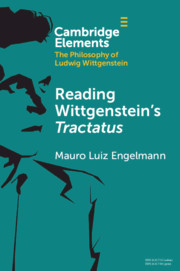Element contents
Reading Wittgenstein's Tractatus
Published online by Cambridge University Press: 29 June 2021
Summary
- Type
- Element
- Information
- Online ISBN: 9781108887892Publisher: Cambridge University PressPrint publication: 29 July 2021
References
References
Stern, D., Rogers, B and Citron, G., eds.Wittgenstein: Lectures, Cambridge 1930–1933; From the Notes of G. E. Moore. Cambridge: Cambridge University Press, 2016.
A Lecture on Ethics. In Philosophical Occasions, 1912–1951. Edited by Klagge, J. C and Nordmann, A.. Indianapolis: Hackett, 1993.
Letters to C. K. Ogden. Oxford:Basil Blackwell, 1983.
Notebooks, 1914–1916. 2nd edition. Translated by G. E. M. Anscombe. Chicago: The University of Chicago Press, 1979 [1961].
Notes on Logic. In Notebooks, 1914–1916. 2nd edition. Translated by G. E. M. Anscombe. Chicago: The University of Chicago Press, 1979 [1961], pp. 93–107.
Notes Dictated to Moore in Norway. In Notebooks, 1914–1916. 2nd edition. Translated by G. E. M. Anscombe. Chicago: The University of Chicago Press, 1979 [1961], pp. 108–119.
Philosophical Investigations. 4th edition, revised. Edited by Hacker, P. M. S. and Schulte, J., translated by G. E. M. Anscombe, P. M. S. Hacker and J. Schulte. Oxford: Wiley-Blackwell, 2009 [1953].
Klagge, J. C. and Nordmann, A., eds. Ludwig Wittgenstein: Public and Private Occasions. New York: Rowman & Littlefield Publishers, 2003.
Prototractatus. Logisch-philosophische Abhandlung. Kritische Edition. Edited by McGuinness, B. and Schulte, J. Frankfurt: Suhrkamp, 2001.
Some Remarks on Logical Form. Aristotelian Society, Supplement 9 (1929), pp. 162–171.
Tractatus Logico-philosophicus. Translated by McGuinness, B. F. and Pears, D.. London: Routledge, 2004 [1961].
Tractatus Logico-Philosophicus. Translated by C. K. Ogden, with an introduction by B. Russell. New York: Dover Publications, 1999 [1922].
McGuiness, B., ed. Wittgenstein in Cambridge: Letters and Documents, 1911–1951. Oxford: Wiley-Blackwell, 2012.
McGuinness, B, ed. and P. Winslow, tr. Wittgenstein’s Family Letters. London: Bloomsbury, 2018.
McGuinness, B., ed. and tr., J. Schulte, tr. Wittgenstein and the Vienna Circle. Oxford: Blackwell, 2003 [1979].
- 17
- Cited by



